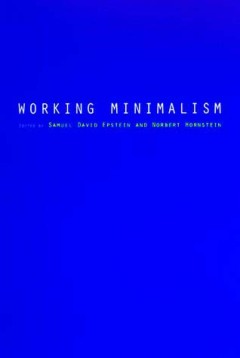Filter by

Working minimalism
AnnotationOCLC-licensed vendor bibliographic record.
- Edition
- -
- ISBN/ISSN
- 9780262272377
- Collation
- 1 online resource (371 pages).
- Series Title
- -
- Call Number
- -

Categories we live by :how we classify everyone and everything
An in-depth analysis of how humanity's compulsion to categorize affects every aspect of our lived experience. The minute we are born -- sometimes even before -- we are categorized. From there, classifications dog our every step: to school, work, the doctor's office, and even the grave. Despite the vast diversity and individuality in every life, we seek patterns, organization, and control. In Ca…
- Edition
- -
- ISBN/ISSN
- 026237711X
- Collation
- 1 online resource (192 pages).
- Series Title
- -
- Call Number
- -

Consequences of language :from primary to enhanced intersubjectivity
"Two senior scholars explain what language does to human beings, especially how it affects our intersubjective competence"--OCLC-licensed vendor bibliographic record.
- Edition
- -
- ISBN/ISSN
- 9780262372749
- Collation
- 1 online resource
- Series Title
- -
- Call Number
- -

The secrets of words
Two distinguished linguists on language, the history of science, misplaced euphoria, surprising facts, and potentially permanent mysteries. In The Secrets of Words , influential linguist Noam Chomsky and his longtime colleague Andrea Moro have a wide-ranging conversation, touching on such topics as language and linguistics, the history of science, and the relation between language and the brain…
- Edition
- -
- ISBN/ISSN
- 9780262369053
- Collation
- 1 online resource (208 pages).
- Series Title
- -
- Call Number
- -

Syntax in the treetops
"A syntactic analysis of and solution to the semantic problem: how can speakers convey the same meaning using different speech acts?"--OCLC-licensed vendor bibliographic record.
- Edition
- -
- ISBN/ISSN
- 9780262369091
- Collation
- 1 online resource.
- Series Title
- -
- Call Number
- -

A selectional theory of adjunct control
"A new theory on adjunct control from a leading linguistics researcher"--OCLC-licensed vendor bibliographic record.
- Edition
- -
- ISBN/ISSN
- 026236610X
- Collation
- 1 online resource.
- Series Title
- -
- Call Number
- -

Linguistics for the age of AI
"An explantion of a knowledge-based system for creating computational agents with human-like language ability"--OCLC-licensed vendor bibliographic record.
- Edition
- -
- ISBN/ISSN
- 9780262363136
- Collation
- 1 online resource.
- Series Title
- -
- Call Number
- -

Merge :binarity in (multidominant) syntax
"An argument for a novel binarity constraint on merge, preventing syntactic movement from relating more than two distinct positions at one time"--OCLC-licensed vendor bibliographic record.
- Edition
- -
- ISBN/ISSN
- 9780262361262
- Collation
- 1 online resource.
- Series Title
- -
- Call Number
- -

Neurolinguistics
"A short, reader-friendly introduction to the neuroscientific study of language. Written by an emerging star in the field"--OCLC-licensed vendor bibliographic record.
- Edition
- -
- ISBN/ISSN
- 9780262368155
- Collation
- 1 online resource.
- Series Title
- -
- Call Number
- -

Changing minds :how aging affects language and how language affects aging
Why language ability remains resilient and how it shapes our lives.OCLC-licensed vendor bibliographic record.
- Edition
- -
- ISBN/ISSN
- 9780262353533
- Collation
- 1 online resource (288 pages).
- Series Title
- -
- Call Number
- -
 Computer Science, Information & General Works
Computer Science, Information & General Works  Philosophy & Psychology
Philosophy & Psychology  Religion
Religion  Social Sciences
Social Sciences  Language
Language  Pure Science
Pure Science  Applied Sciences
Applied Sciences  Art & Recreation
Art & Recreation  Literature
Literature  History & Geography
History & Geography